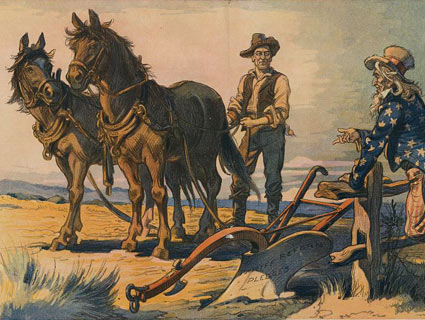
<a href="http://flickr.com/link-to-source-image">Alexey Stiop</a>/Shutterstock
Remember the farm bill, that once-in-five-years legislation that sets the nation’s agriculture and hunger policy? Due for reauthorization in 2012, it lurched through both the Senate and the House ag committee. But then it floundered on the floor of the House—whose GOP leadership refused to bring it to a vote, in an attempt to avoid conflict with tea party stalwarts seeking draconian cuts in anti-hunger programs.
But everything changed on New Year’s Day, when the fiscal-cliff deal between Congress and the White House included a fast-and-dirty, stop-gap farm bill compromise that will be in place only until September—meaning that Congress will have to start from scratch on a new five-year bill this year.
Thus like the fiscal-cliff deal itself, the farm bill extension amounts to a feeble kick of the can down the road. And as you might expect from something hastily slapped together behind closed doors, it’s a policy hodgepodge, and mostly a dismal one. The National Sustainable Agriculture Coalition, the main progressive ag lobbying group, minced no words in its assessment: “a disaster for farmers and the American people.”
I got Ferd Hoefner, NSAC’s policy director and a longtime farm bill observer, to explain what’s in the deal. Here are the main points:
- A slew of progressive ag programs got zero funding for the next nine months. Zilch. Programs that got the ax—which are even on a good day funded at pennies on the dollar compared to Big Ag sops like farm subsidies—include one that defrays some costs for farmers who convert to organic, one that helps communities launch farmers markets, one that funds research on organic farming, and one that helps minority farmers. Funding these programs would have amounted to “a couple hundred million dollars,” Hoefner said. They could be revived in a 2013 farm bill, Hoefner said, but until and unless they are, the USDA administrator overseeing them will be reassigned to other tasks, and the programs are on life support. Hoefner said he was puzzled as to why the White House didn’t insist on maintaining them in the fiscal-cliff deal. If the White House had pushed the issue, “what, [the Republicans] would have walked off the fiscal cliff? I have a hard time believing that.”
- While cheap progressive ag programs got axed in the name of fiscal rectitude, a $5 billion program historically beloved of Big Ag got renewed: direct payments to farmers of certain commodity crops like corn, soy, and cotton. Ironically, the Big Ag lobby had signed off on the elimination of direct payments. Both the Senate and the House ag committee versions had replaced that much-maligned program with a highly subsidized crop insurance scheme—a move reform groups like NSAC saw as less than ideal, but a step in the right direction. The fiscal cliff deal ends that; direct payments will continue in 2013.
- Ironically—and in a pleasant surprise—the farm bill’s priciest program of all, the Supplemental Nutrition Assistance Program (SNAP), formerly known as food stamps, barely got cut at all. SNAP, which costs around $80 billion per year and provides food aid for 43 million Americans, half of them children, was the very program that sank the farm bill process on the House floor last summer. The Senate version of the bill included a $4.5 billion cut over the next five years, while the House ag committee version sliced $16 billion over 10 years. But House Speaker John Boehner refused to bring the farm bill to a vote, because of what the New York Times called a “split in the ranks of House Republicans over the degree of spending cuts, pitting conservatives who want deeper cuts against moderates and Democrats who think the bill goes far enough at a time of weak economic growth.” In the fiscal-cliff deal, SNAP took just a $100 million trim and it didn’t affect benefits at all—just a program that promotes healthy eating among beneficiaries. No doubt House GOP stalwarts who hate poverty programs will be back in force for the next round of farm bill negotiations, but for now, SNAP funding remains intact.
Overall, Hoefner told me, the Obama administration “has this blind spot—passing a farm bill is something they’ve never really been interested in.” As for the House GOP leadership, it never even allowed debate on its ag committee’s farm bill in 2012. The same players remain in place this year. What does that mean for the next round of food and farm policy negotiations? “Frankly, I have no idea,” said Hoefner, who has been involved in every farm bill since the mid-1970s. US farm policy has entered uncharted territory.















